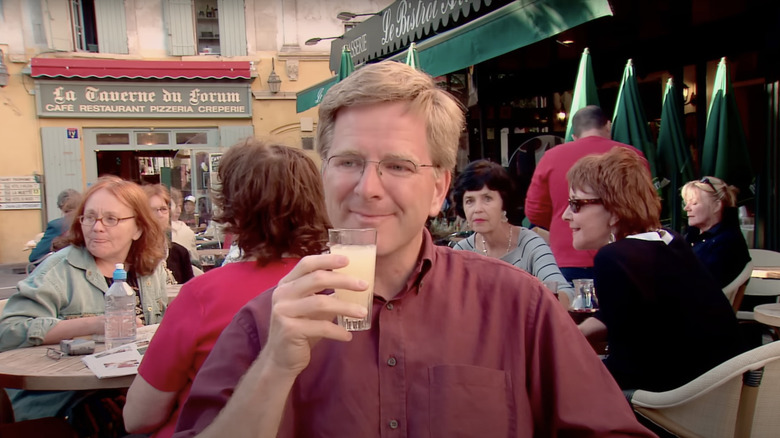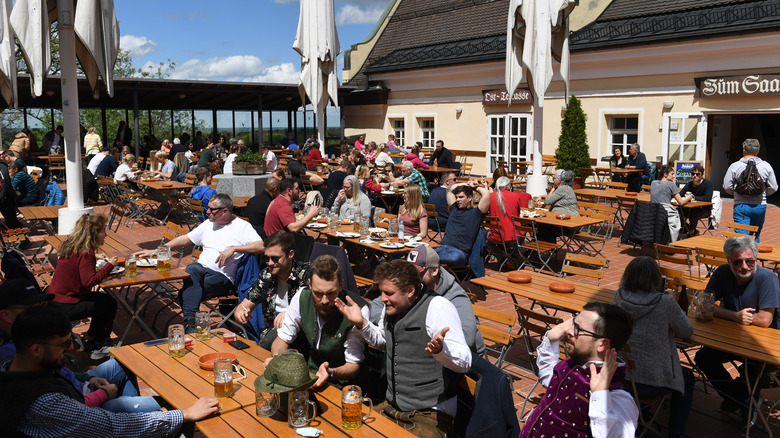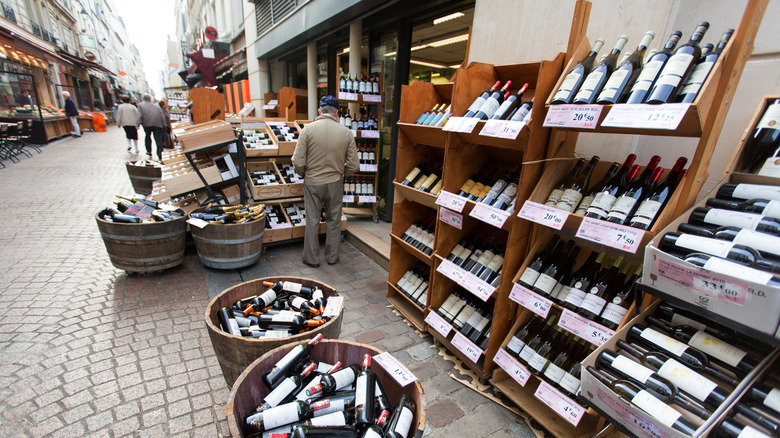Rick Steves' Secret To Cheaper Alcohol While In Europe
Beyond the budget for accommodations, meals, and tours to the endless sights in Europe — all of which don't necessarily come cheap — one must also account for drinks. After all, what's a swell trip without a celebratory toast? In Europe, one can drink expensive like a tourist or cheap like a local: the choice is yours. Among travel guru Rick Steves' many hacks, one that stands out for travelers looking to enjoy Europe's rich beverage culture without breaking the bank is his secret to cheaper alcohol.
Rick Steves' main tip is to drink like a local. In Europe, every region has its preferred type of locally produced alcohol, which reduces costs associated with transportation and importation. For example, in Portugal, indulging in some vinho verde is significantly cheaper than ordering a Californian Chardonnay. How cheap? $4 — not for a glass, but for the whole bottle! Similarly, a local beer in Germany will cost less than an imported one from America. A pint of Pilsner or Helles will run $2 to $4.
Beyond the familiar beers and wines, European specialties are anything but boring. Even if you can't pronounce the name or it burns your throat, Rick Steves recommends trying the distilled stuff. How about grappa or limoncello in Italy? Or ouzo, an anise-flavored alcohol invented by monks in Greece? Say bonjour to the green fairy of absinthe in France or indulge in pálinka, a fruity brandy, in Hungary. The unforgettable local buzz is sensational, culturally enriching, and more affordable.
The where and when of drinking in Europe
Beyond what you're drinking, it also matters where you're drinking. Hungary, Romania, and Bulgaria have the cheapest alcohol in the European Union, whereas in Finland, Ireland, and Sweden, the prices more than double. Avoiding tourist traps is essential — bars and pubs in popular tourist areas often hike prices due to their prime locations. Venturing a few streets away can lead to discovering local watering holes where prices are lower and the experience more authentic.
In Germany, Rick Steves recommends drinking in beer gardens like the Andechs Monastery (his favorite) or, better yet, in Munich, a pretty city with the best beer scene you'll find in Europe. Otherwise, he suggests trying whisky at Leslie's Bar in Edinburgh and, in France, enjoying wine in the right terroir. Furthermore, Steves cautions that touristy cities around Italy, like Rome and Florence, charge double or triple for sitting at a table rather than standing at the bar.
Rick Steves also recommends taking advantage of happy hours. Many European bars and pubs offer specials where drinks may be half-price or buy-one-get-one-free. Steves also swears by aperitivo time in Italy, the sacred pre-dinner ritual. Typically served between 6 p.m. and 8 p.m., an aperitivo can cost $5 for a glass of wine with chips or $10 to $15 for a traditional cocktail like a Campari spritz, which includes a plate of charcuterie, plus a spot to people-watch and soak it all in.
Make sure you're a savvy traveler and a savvy drinker
For those who prefer enjoying a drink in the comfort of their hotel room, buying alcohol from supermarkets is a smart idea. Grocery stores in Europe have a wide selection of wines, beers, and spirits at prices much lower than those in bars or restaurants. A bottle of beer for $1 or wine for $5 can be a delightful way to end a day of sightseeing. Duty-free shopping can also offer competitive prices, especially on bulk purchases, and Steves also suggests neighborhood wine shops.
Wine or beer tastings are another cost-effective way to enjoy a variety of high-quality beverages. Many vineyards and breweries offer free or discounted tours that include tastings. However, Rick Steves warns against big-name wines, such as Bordeaux or Burgundy, as those are more expensive than smaller regions, such as Languedoc or Sud-Ouest. The important thing is to drink wine in wine countries, like France, and beer in beer countries, like the Czech Republic — more cost-effective and culturally relevant.
When dining out, Rick Steves recommends checking the price of drinks before ordering, as beverages can sometimes be as expensive as the meal itself. Opting for house wines in Rome (save you $20!) or asking for the "vin de la maison" in Paris can yield more budget-friendly choices. Additionally, in countries like Italy and Spain, ordering a "tinto de verano" (mix of red wine and lemon soda) or a "spritz" (prosecco with a splash of bitter liqueur) can be cheaper than international cocktails. Cheers!


